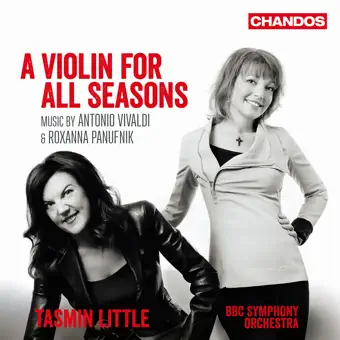december 2016
A Violin For All Seasons (Vivaldi & Panufnik)
Tasmin Little & BBC Symphony Orchestra
Vivaldi-spel dat put uit het gewicht van een modern orkest, om nog maar te zwijgen van Littles virtuositeit, terwijl we in Panufniks stuk worden meegenomen op een lonende en cultureel rijke reis.

‘Ik ben geen barokspeler’, zegt Tasmin Little, en er gaat niets boven het open op tafel leggen van je kaarten. Dit zijn uitvoeringen van Vivaldi met moderne instrumenten en een grote symfonische strijkerssectie. En als je nog niet schreeuwend naar je Fabio Biondi of La Serenissima-sets bent gerend, zul je deze cd erg leuk vinden.
Dus binnen de perken ‘Spring’, paraderend als een haan – gedurfd, helder en aanstekelijk (er is geen ander woord voor) veerkrachtig. Met Little die de viool dirigeert, is er een bevredigend stortvloedig gewicht in de stortbuien van ‘Summer’, net zoals de langzame delen van ‘Spring’ en ‘Summer’ een speciaal gedempte intensiteit hebben wanneer ze door een groter strijkerscorps worden gespeeld. Geen Kennedy-achtige deconstructie hier: Little reageert gewoon op de muziek met een open-eyes frisheid en fantasie die des te opmerkelijker is als je bedenkt hoe vaak ze deze werken moet hebben gespeeld. Ze is levendig en spraakzaam en brengt een levendig karakter over op haar collega's. Luister naar de kleine ijspegelwervelingen van David Wrights klavecimbel aan het begin van 'Winter' of de gedurfde pizzicato's in de laatste jacht van 'Autumn'. Momenten zoals de innerlijke beweging van 'Winter', waarin Little haar glanzende toon over de hele melodie drapeert, zijn een heerlijke bonus.
Littles virtuositeit komt spectaculair naar voren in Roxanna Panufniks Four World Seasons - of het nu gaat om de Piazzolla-achtige ritmes en stratosferische hoogten van de openingsscène 'Autumn in Albania', een Himalaya-winterscène compleet met luidende, kwetterende Tibetaanse klankschalen, of Littles fantastisch vrije maar precieze imitaties van vogelgezang in de glinsterende 'Spring in Japan'. Panufnik heeft een zeer effectief antwoord op Vivaldi geschreven, ideaal afgestemd op Littles kunstenaarschap. Boekje-notities van Jessica Duchen zijn de kers op de taart.

‘I am not a Baroque player’, says Tasmin Little, and there’s nothing like laying your cards right out on the table. These are modern-instrument performances of Vivaldi with a big symphonic string section. And if you haven’t already run screaming for your Fabio Biondi or La Serenissima sets, you’re going to enjoy this disc a lot.
So in bounds ‘Spring’, strutting like a cockerel – bold, bright and infectiously (there’s no other word for it) springy. With Little directing from the violin, there’s a satisfyingly torrential heft to the downpours of ‘Summer’, just as the slow movements of ‘Spring’ and ‘Summer’ have a specially hushed intensity when played by a larger body of strings. No Kennedy-like deconstruction here: Little simply responds to the music with an open-eyed freshness and fantasy that’s all the more remarkable when you consider how often she must have played these works. She is lively and conversational, and conveys a vivid sense of character to her colleagues. Listen to the little icicle swirls from David Wright’s harpsichord at the start of ‘Winter’ or the gutsy pizzicatos in the final hunt of ‘Autumn’. Moments such as the inner movement of ‘Winter’, where Little drapes her lustrous tone all over the melody, are a delicious bonus.
Little’s virtuosity comes spectacularly to the fore in Roxanna Panufnik’s Four World Seasons – whether in the Piazzolla-like rhythms and stratospheric heights of the opening ‘Autumn in Albania’, a Himalayan winter scene complete with chiming, warbling Tibetan singing bowl, or Little’s fabulously free but precise birdsong imitations in the shimmering ‘Spring in Japan’. Panufnik has written a really effective response to Vivaldi, ideally tailored to Little’s artistry. Booklet-notes by Jessica Duchen are the icing on the cake.
